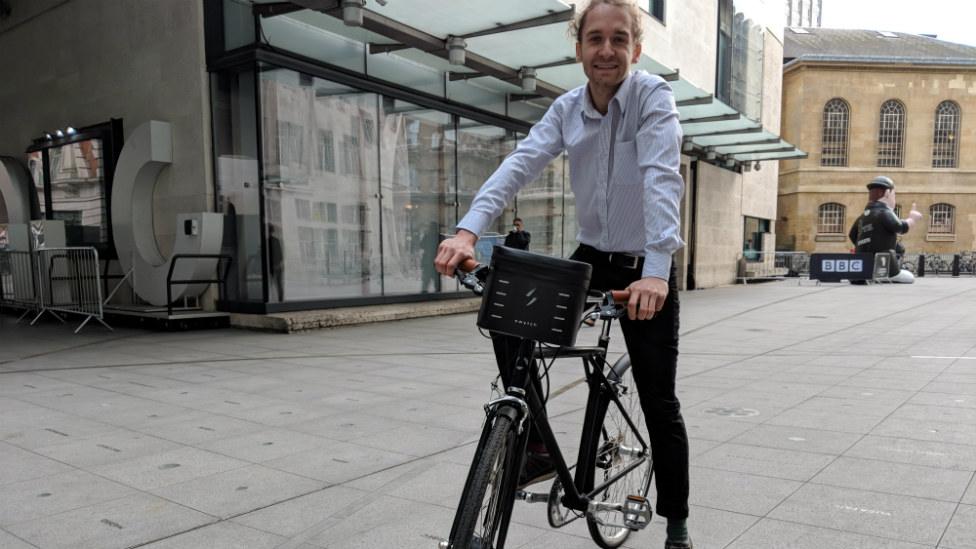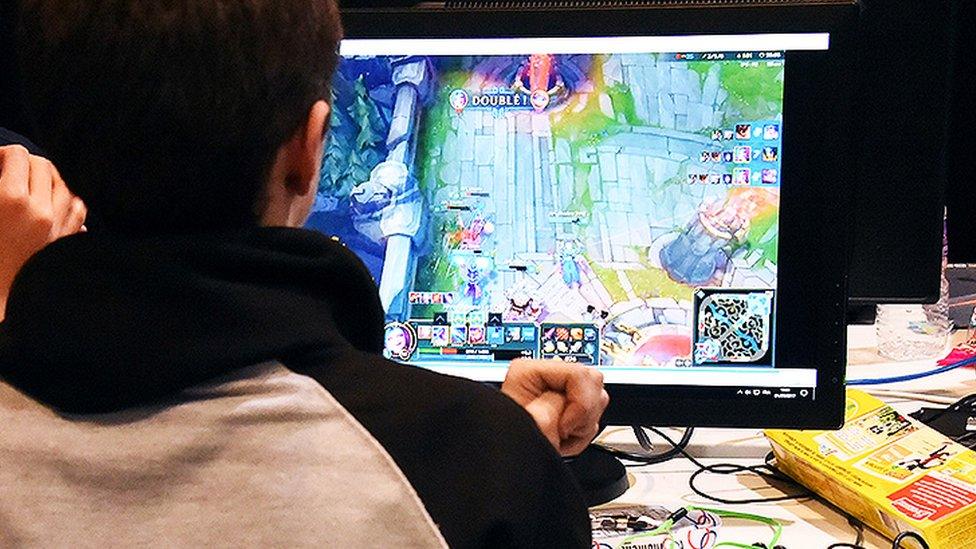Tech Tent: Tencent and electric bikes
- Published

Stream or download, external the latest Tech Tent episode on the BBC website
Listen to previous episodes on the BBC website
Follow Tech Tent, external on Twitter

On this week's Tech Tent we find out about the Chinese company's plans for global expansion and hear how one of its main products is now on show in a London museum. Plus - are electric bikes the real game changers in city transport?

Tencent owns the hugely popular, and lucrative, League of Legends game
China's social media superpower
Anyone who has been paying attention over recent years will have noticed Facebook becoming one of the world's most powerful and valuable companies, with an extraordinary and sometimes malign impact on the way we live.
But in the West at least far fewer people will have noticed the rise of Tencent. Yet this week, for a while, the Chinese tech giant surpassed the valuation of Facebook as investors reacted to another sparkling set of results.
I first came across the company five years ago when it set up a major operation in London to cover the 2012 Olympics for its vast social media audience. It was already clear that this was a company doing more innovative things with its platforms than the American social media platforms could manage.
Since then it has continued to expand into new territories and markets - just this week it brought its WeChat Pay service to both Malaysia and the UK.
Kitty Fok, managing director of research firm IDC China, tells us that social media isn't even Tencent's most lucrative business now. It comes in second after its gaming division which owns League of Legends maker Riot Games and most of Supercell, the firm behind Clash of Clans.
"Compared to Facebook which has the majority of its income coming from ads, Tencent provides a lot more variety of services to the market," she says. "And we're expecting it to diversify even more."

The WeChat service is now on show in London's V&A museum
WeChat at the V&A
One place which has certainly woken up to the rise of Tencent is London's Victoria and Albert Museum. The V&A, a treasure trove of beautiful objects from 1500 to the present day, has included Tencent's WeChat messaging service in its collection.
On display is a smartphone running a video showing WeChat - as it's a live server-based application this was the only way to display it with any permanence. There is also a tablet with an animation of the Bubblepup sticker which users add to their messages, and then in a charmingly analogue twist, the pen and pencil drawings showing the work of the WeChat designers as they sketched out the sticker.
But why does this merit a place in the museum? "We are interested in how we live together and the role that digital plays," explains Corinna Gardner, the V&A's senior curator for design and digital. "WeChat offers a lifestyle within an app."
She points out that it allows users to book a doctor's appointment, send money to friends, and just communicate, and that its design is all about problem solving. Writing Chinese characters on a touchscreen is a huge challenge so WeChat was very early in adding voice recognition and stickers to aid communication.
So how does she hope visitors will react when they wander past the antique furniture, the clothes, the ceramics and come across WeChat?
"With joy, I hope," she says.
"Design has always been a means to understand how we all live together and social media, the digital world is part of our every day and WeChat is one of the forerunners within that field."
This is not a temporary exhibit, so the challenge will be to keep the smartphone alive for decades to come showing how we lived in 2017.

Montague: E-bikes can be cheaper and simpler
Supercharging e-bikes
Suddenly it's becoming conventional wisdom that electric vehicles are the way forward if cities are to deal with a crisis of congestion and air pollution, but could it be bicycles rather than cars which are electrified first?
A number of cities around the world are already backing the idea, but the cost of a new electric bike is beyond most people, and while you can get kits with motors and switches that turn any bike into an e-bike, they too have been rather expensive.
Now a young London-based inventor thinks he can bring down the cost.
Oliver Montague has created the Swytch bike, a cheap e-bike kit which has roared past its $50,000 (£38,000) target on the Indiegogo crowdfunding site.
He tell us that it is important to keep things simple: "Electric transport needs to become a lot more affordable - people don't need Bluetooth on their electric bikes."
The Oxford engineering graduate, who has been running another e-bike business for four years, is messianic in his vision of our electric future: "I'm confident that the electric bike industry in the west is going to be as significant as the motor industry."
Mind you, delivering on that sort of vision has proved difficult for some crowdfunded projects.
On our visit to the Victoria and Albert Museum we came across another hi-tech exhibit, the Zano mini-drone. This project turned out to be Europe's biggest crowdfunding failure and is in the museum as a reminder of how lofty ambitions can fall to earth.
- Published23 November 2017

- Published21 November 2017
